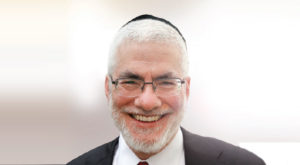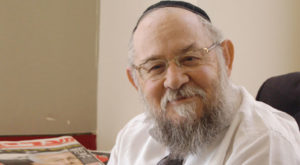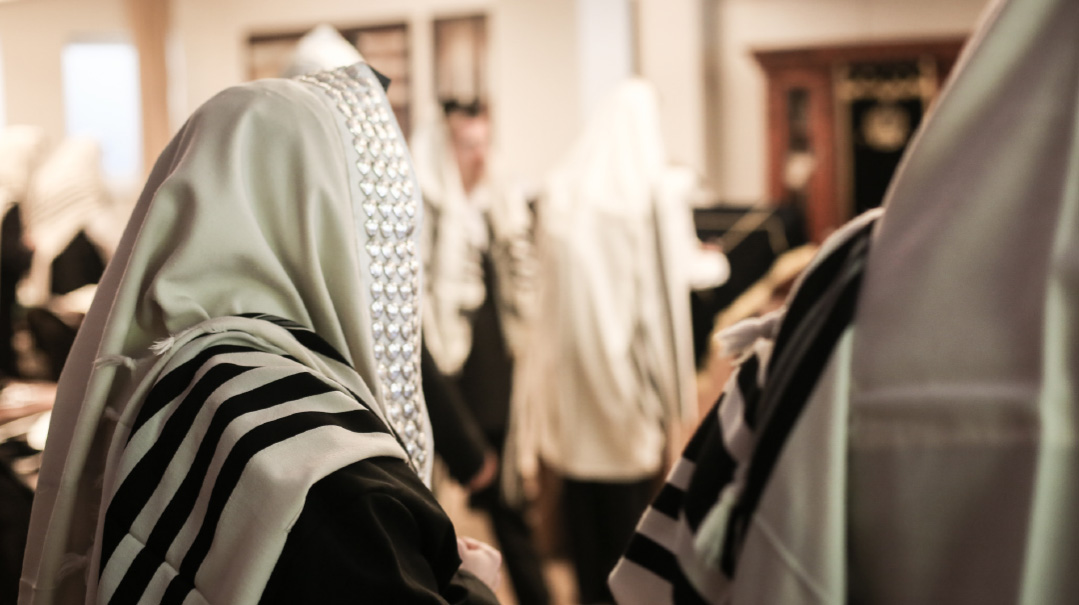For Tefillah to Work, You Must Believe in It

It brought geulah then, it will bring geulah now, bimheirah v’yameinu
I recently merited making the acquaintance of a very dedicated, creative fourth-grade rebbi, who shared an effective tactic he uses to illustrate the incredible opportunity we have when we beseech Hashem with our tefillah.
In front of his talmidim, this rebbi calls the White House on speaker phone and asks to speak with the president. When, as expected, he receives a negative response, he presses further and asks the receptionist why his call cannot be put through. He is then informed — sometimes patiently, sometimes not — what it takes to merit a personal conversation with the leader of the free world. The rebbi then thanks the receptionist and hangs up.
He turns to his boys and contrasts the difficulty of speaking to the president with the open-door policy that allows us to approach the Melech Malchei Hamelachim whenever we choose. We are encouraged to pick up our siddur or Tehillim and talk away to the listening Ear on the other end of the line. Better yet, we are granted a personal audience with Him! The lesson is never lost on anyone.
The Yom Tov of Pesach is replete with teaching moments. Although the focus of our preparations is on readying the house and preparing for the Seder, there is a second part of the Yom Tov that shouldn’t be neglected. Shvii shel Pesach, the anniversary of Kri’as Yam Suf, offers numerous lessons all its own. It is not really included in the narrative of the Haggadah, because the mitzvah of sippur yetzias Mitzrayim centers on the night of our redemption. Nevertheless it surely was an integral part of the geulah and deserves our attention. (As an aside, the Mishnah Berurah quotes early sources that one merits forgiveness if he recites Shiras Hayam with joy, even on a regular weekday.) One of the lessons of Kri’as Yam Suf would be appreciated by those fourth-graders, as well the rest of us.
The Torah relates that when Klal Yisrael reached the Yam Suf, they were completely trapped. The sea was in front of them, the attacking Mitzrim were behind them, and they had absolutely nowhere to go. Moshe Rabbeinu proceeded to do what we learn from our Avos Hakedoshim; he began to daven. Yet the pasuk relates Hashem’s reaction to Moshe’s tefillah, “Ma titzak eilai — why are you screaming to Me? Tell Bnei Yisrael to travel [into the sea].” Commentators ask the obvious question: Was there any other option? Isn’t tefillah our time-honored approach to any eis tzarah?
If we look into Midrash Rabbah, we will find the answer to this question (chapter 21:4). The Midrash comments on the pasuk “Tefillah l’ani ki ya’atof” and its similarity to the pasuk “Tefillah l’Moshe ish ha’Elokim,” and tells us that unlike human kings, who exclusively favor the rich and influential with access, our King is readily receptive to everyone’s tefillah — the poor, slaves, anyone perceived as being inconsequential. Their tefillos are as effective as the tefillos of Moshe Rabbeinu himself. And this was Hashem’s intent in telling Moshe he had no need to daven, because everyone else had already done so, and their tefillos had been accepted. Even to split a sea.
We must dispel the notion that only tzaddikim as depicted in glossy pictures and ads can daven for us. Any Yid davening sincerely can accomplish so much. Chazal famously taught us of the power of tefillah of the children who accompanied Mordechai in beseeching Hashem to save us from the decree of Haman. No 40 days at a famous kever, no other segulos or donations to a prominent tzedakah, either. It was just tefillah, pure and sincere. And it carried the day.
Not chalilah to diminish the power of tzedakah either, it is worth sharing a humorous anecdote I heard from a prominent Yerushalmi rebbetzin. A large family had arranged for a van to pick them up on Erev Pesach to take them to their grandparents’ home on the other side of Yerushalayim. The hour was late, their van was nowhere to be seen, and the mother was quite concerned that they would be stranded with no other means of transportation.
The father, sensing his wife’s concern, exclaimed that one thing he would not do was promise money to the Vaad Harabbonim, which would undoubtedly promote their miraculous yeshuah in their next ad campaign. He took out his Tehillim instead, and shortly thereafter a different van appeared, asking if their large crew needed a ride somewhere.
Upon reaching the grandparents’ home shortly before Yom Tov, the zeidy expressed with relief, “I was so concerned that you weren’t going to make it on time, I promised money to Vaad Harabbonim!”
The reader can decide what did the trick.
The authoritative biography of Rav Shimshon Pincus records the following anecdote. When little Shimshon was just eight years old, his father was about to make his way to shul to learn all night on Shavuos. The budding talmid chacham wanted to join his father, but was told in no uncertain terms that he was too young and would have to remain home. As the elder Rabbi Pincus walked to shul, he had a change of heart, and decided to give in to his ambitious child’s request.
He entered his home and was surprised to see young Shimshon standing in the doorway, dressed and ready to go. The astonished father realized his son had clearly been expecting him, and asked how he knew that he was returning.
Shimshon innocently replied, “I davened for you to come back for me.”
The tefillah of a child, pure and simple. He believed it, we should believe it.
The sefer Divrei Shalom records an incident about Rav Shalom of Stropkov that reinforces this concept, and shows how great tzaddikim recognized the power of sincere tefillah, even that of seemingly simple townsfolk. One day, the tzaddik Rav Shalom exited his home and saw his hoiz bochur (attendant) standing by the door, reciting Tehillim with a broken heart.
The Rebbe asked him about the nature of his problem. The young man replied that he was davening to Hashem that the upcoming winter not be rainy because his ripped shoes couldn’t keep his feet dry. The Rebbe begged the hoiz bochur to stop, because that very day two lumber merchants who needed to transport their merchandise over the river had asked the Rebbe to daven for abundant rain, to facilitate their shipments by riverboat. The Rebbe had accepted their pidyon gelt and promised to daven on their behalf.
Now he told his attendant, “Your sincere tefillas ani will be more readily accepted than mine!” The Rebbe proceeded to give the man money to buy himself a new pair of shoes and demanded he give his word that he would desist from davening any further.
The great ones among us understand the greatness of everyone else, especially their sincere tefillos.
The Gemara in Rosh Hashanah tells us that two people can be subject to the same potential fate, whether they are both struggling with a serious illness or have been sentenced to death by the king. One will survive while the other will not, for this one davened a tefillah sheleimah — complete tefillah, and the other one did not.
Rashi, commenting on this gemara, explains tefillah sheleimah as simply — hiskavein, he had kavanah. What does Rashi mean? Wouldn’t someone doomed to death have kavanah? Said Rav Eliyahu Lopian ztz”l, one man sincerely believes in the power of his tefillah, whereas the other one is not so sure. Unless one has perfect faith in the efficacy of his davening, he risks forfeiting its power.
The late Rosh Yeshivah of Telshe Yeshiva of Chicago, Rav Chaim Schmelczer ztz”l, related a powerful anecdote to bring this point home. A gentleman approached the Alter of Kelm, Rav Simcha Zissel Ziv ztz”l, to intercede on his behalf for his son, who was ill and needed to see a particular doctor. The Alter responded that he might indeed be able to get him into the doctor, but he could offer him ten bochurim to say Tehillim on his behalf instead.
The distraught father expressed his appreciation for the offer, but asked if that would really help without an audience with the doctor. Detecting the man’s cynical attitude to the power of tefillah having any effect at all, he admonished him, “If you really believed in the power of sincere tefillah, it would. If you doubt its ability to help, then it will not!”
Coming back to Pesach — we invest an entire night (or two) in our emunah like no other. It is not just emunah in Hashem we are reinforcing, but our belief in our ability to bring about geulah. Moshe Rabbeinu’s name is not even mentioned once in the entire Haggadah. But the Haggadah does refer to the entirely of Am Yisrael and the power of their tefillos, as the Zohar comments on the words “v’taal shavasom” — and their screams went up to Hashem”: “sha’avah is tefillah.”
We must all believe in the potential of our sincere tefillos today as much as we believed in it at that time. It brought geulah then, it will bring geulah now, bimheirah v’yameinu.
(Originally featured in Mishpacha, Issue 805)
Oops! We could not locate your form.












